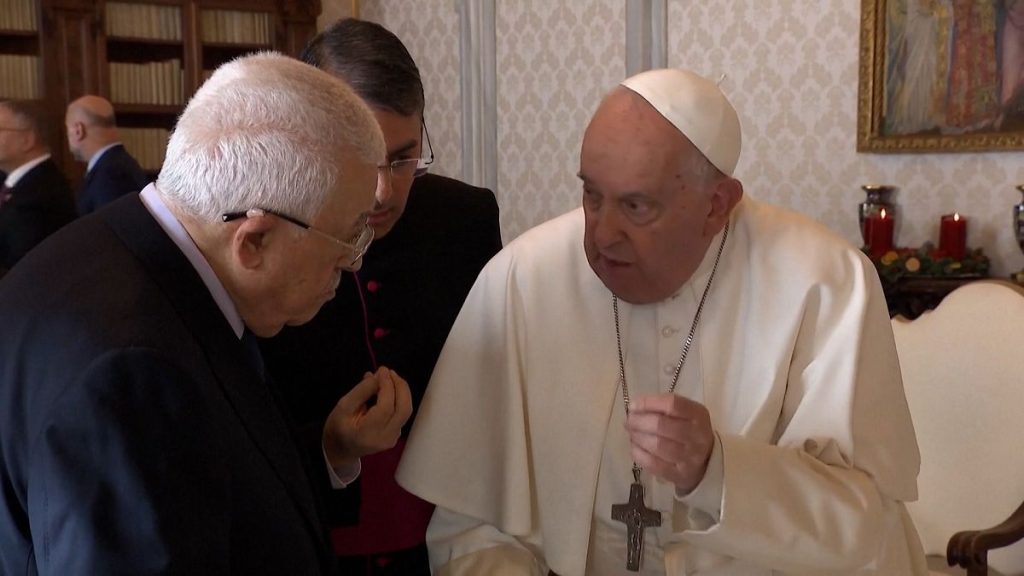The recent meeting between Pope Francis and Palestinian President Mahmoud Abbas at the Vatican underscored the enduring relationship between the Holy See and the Palestinian people, while also highlighting the ongoing complexities of the Israeli-Palestinian conflict. The discussions, taking place against the backdrop of escalating violence in the region, focused on shared aspirations for peace, stability, and a just resolution to the decades-long conflict. Central to the Vatican’s stated position was the hope for an immediate ceasefire, the unconditional release of all hostages, and the pursuit of a viable two-state solution based on international law and existing UN resolutions. This two-state solution, as envisioned, would guarantee the establishment of an independent and sovereign Palestinian state alongside Israel, allowing both nations to coexist peacefully and securely. The Vatican reiterated its unwavering commitment to Jerusalem’s unique status as a holy city for the three Abrahamic faiths – Judaism, Christianity, and Islam – emphasizing the importance of ensuring access and freedom of worship for all believers.
Beyond the political dimensions, the meeting also provided an opportunity to acknowledge the Catholic Church’s significant humanitarian role within Palestinian society. For decades, the Church has maintained a steadfast presence in the region, providing essential social services, educational opportunities, and healthcare to vulnerable Palestinian communities. These efforts, often carried out under challenging circumstances, demonstrate the Church’s commitment to supporting the well-being of the Palestinian people and fostering a spirit of hope amidst adversity. The continued provision of these services serves as a tangible expression of solidarity and a testament to the Church’s enduring mission of compassion and service.
The symbolic exchange of gifts between the two leaders further illuminated the nature of their relationship and the shared desire for peace. President Abbas presented Pope Francis with paintings depicting previous encounters between the two, signifying the continuity of their dialogue and shared commitment to resolving the conflict. These artistic representations of past meetings serve as visual reminders of the ongoing conversations and shared efforts towards finding a peaceful resolution. In return, Pope Francis offered President Abbas a bronze statue inscribed with the poignant message “Peace is a fragile flower.” This gesture encapsulates the delicate and precious nature of peace, highlighting the need for constant nurturing and protection in the face of ongoing challenges. The exchange of these symbolic gifts underscored the importance of dialogue, mutual understanding, and unwavering commitment to building a lasting peace in the region.
The Vatican’s emphasis on a two-state solution reflects the longstanding international consensus on resolving the Israeli-Palestinian conflict. This framework, rooted in the principles of self-determination and mutual recognition, envisions the creation of two independent states living side-by-side in peace and security. The envisioned Palestinian state would be established on territories occupied by Israel since the 1967 Six-Day War, with East Jerusalem as its capital. This arrangement aims to address the core issues of the conflict, including territorial disputes, the status of Jerusalem, and the right of return for Palestinian refugees. Achieving a two-state solution, however, remains a complex and challenging endeavor, requiring significant political will and compromise from both sides.
The precarious security situation in the region and the resurgence of violence add further urgency to the call for peace. Recent escalations have resulted in numerous casualties and heightened tensions between Israelis and Palestinians, underscoring the fragility of the situation and the urgent need for de-escalation. The Vatican’s appeal for a ceasefire and the release of hostages reflects a deep concern for the human cost of the conflict and the imperative to protect civilian lives. The ongoing violence serves as a stark reminder of the urgent need for a sustainable peace agreement that addresses the root causes of the conflict and ensures the security and well-being of both Israelis and Palestinians.
The meeting between Pope Francis and President Abbas represents a continuation of the Vatican’s diplomatic efforts to promote peace and reconciliation in the Holy Land. The Holy See, through its diplomatic channels and humanitarian initiatives, plays a crucial role in advocating for a just and lasting solution to the Israeli-Palestinian conflict. By fostering dialogue, promoting interfaith understanding, and providing humanitarian assistance, the Vatican contributes significantly to the pursuit of peace and stability in the region. The continued engagement of the Holy See in this complex and challenging context serves as a beacon of hope for a future where Israelis and Palestinians can live together in peace and mutual respect.














